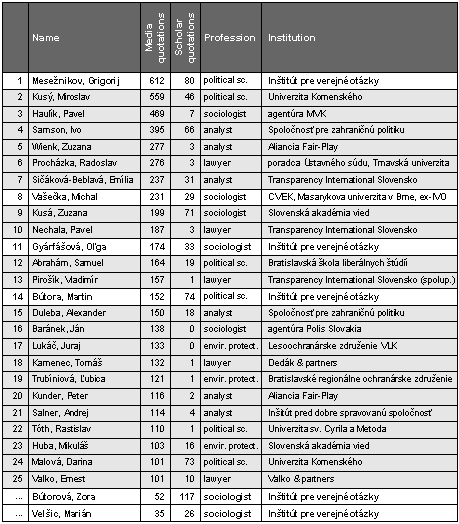“Opinions of experts from various areas covered by the media form natural part of news reporting, especially if the given medium has an ambition to analyze and clarify the context of particular events. Due to their assumed independence and expertise, these experts enjoy great influence and are able to help readers or viewers see what party of a dispute between two politicians or lobby groups presented better arguments”, reads an analysis titled Who Are the Most Frequently Quoted Experts in Slovak Media? The analysis presents unique findings of Slovak Press Watch, a research project conducted by INEKO, an independent economic think-tank.
In the first of a series of analyses examining the role of experts in the media, analysts Martin Dubéci, Slovak Press Watch fellow and student of the Faculty of Social Studies in Brno, Czech Republic, and Gabriel Šípoš of INEKO focused on media and academic quotes by economic and domestic politics experts. The data were gathered exclusively from open sources. Experts’ quotations in the media were monitored between September 1, 2002 and December 4, 2006, using the Newton IT database. The monitored media sources included SME and Pravda daily editions and evening news broadcasts of all national TV stations, i.e. STV, TV Markíza, TA3 and TV JOJ. Counted were only those quotes in which experts presented their opinions on public issues. If they were quoted as representatives of their institutions, advisors to government officials or other functionaries, the quotation did not count. Academic quotations of political analysts and sociologists were monitored through the Google Scholar website. Due to the project’s novelty, the results of this monitoring should be treated as tentative.
As the analysis of results shows, the category of domestic politics experts is dominated by the quartet of Grigorij Mesežnikov, Miroslav Kusý, Pavol Haulík, and Ivo Samson whose quotes made up almost one third of all quotes by top 25 experts. The high frequency of quotes by experts in some areas is also determined by the fact that in Slovakia, only a handful of experts specialize in certain areas such as corruption (e.g. the Fair-Play Alliance or Transparency International Slovakia). Generally speaking, non-governmental think-tanks play a very strong role in this category. Unlike the category of economic experts, though, this category shows greater diversity of opinions and orientations that may subsequently show in media coverage.
The results are encouraging for the Institute for Public Affairs (IVO) as an independent think-tank specializing in public discourse and critical analysis. As the Table shows, IVO analysts are among the most frequently quoted experts in the field of domestic politics.
Number of media and academic quotations by domestic politics experts
